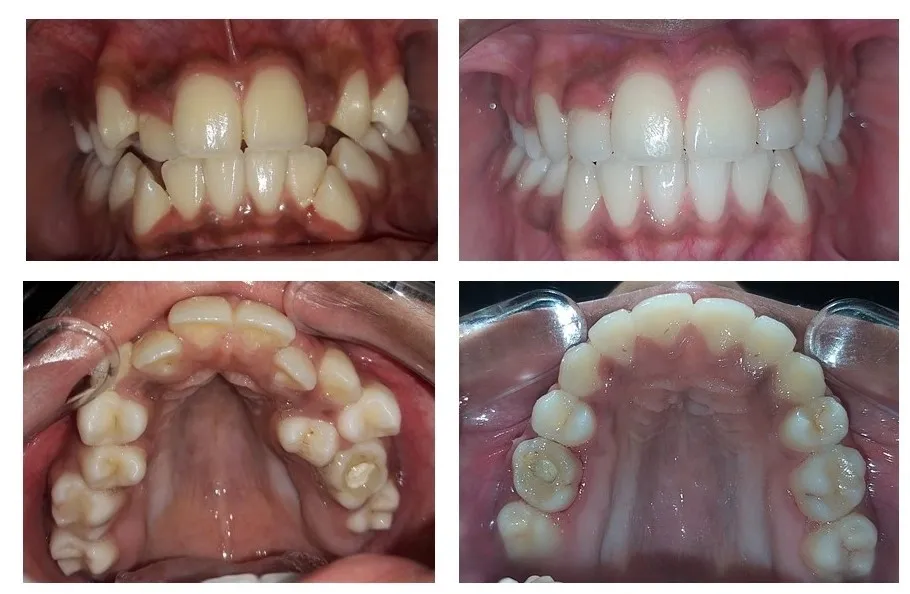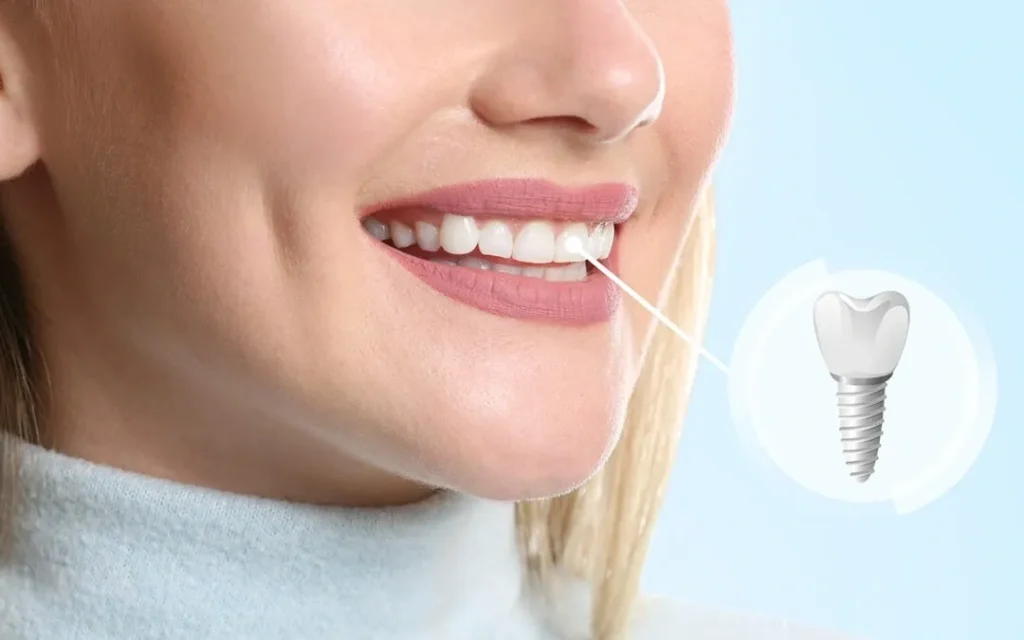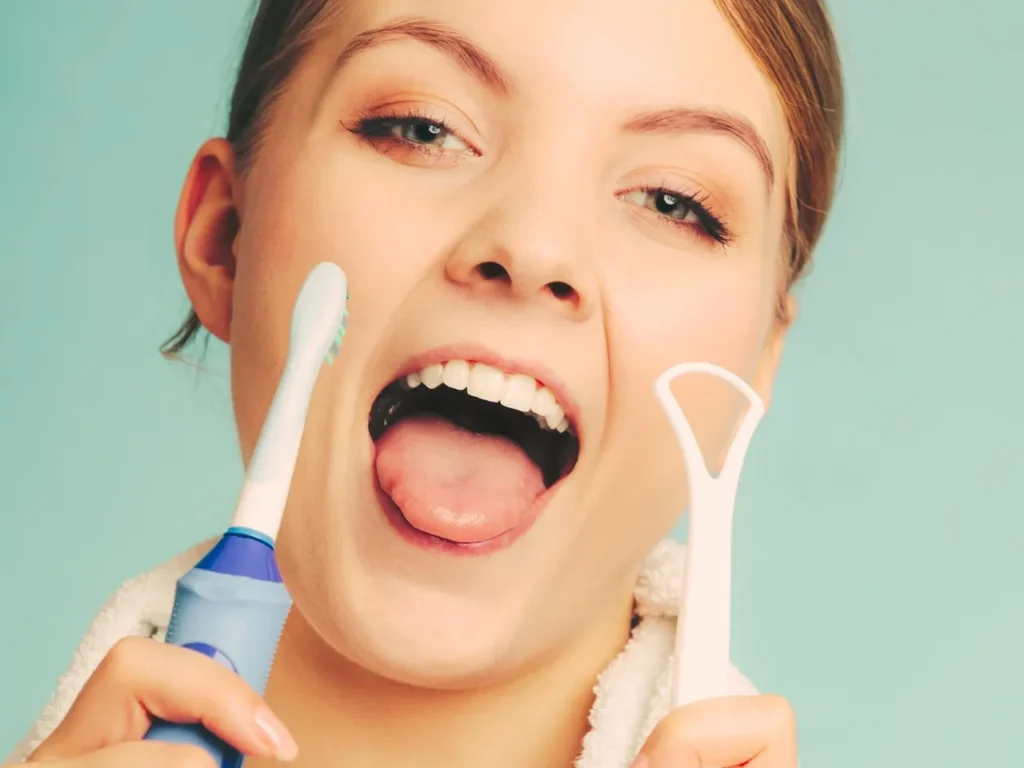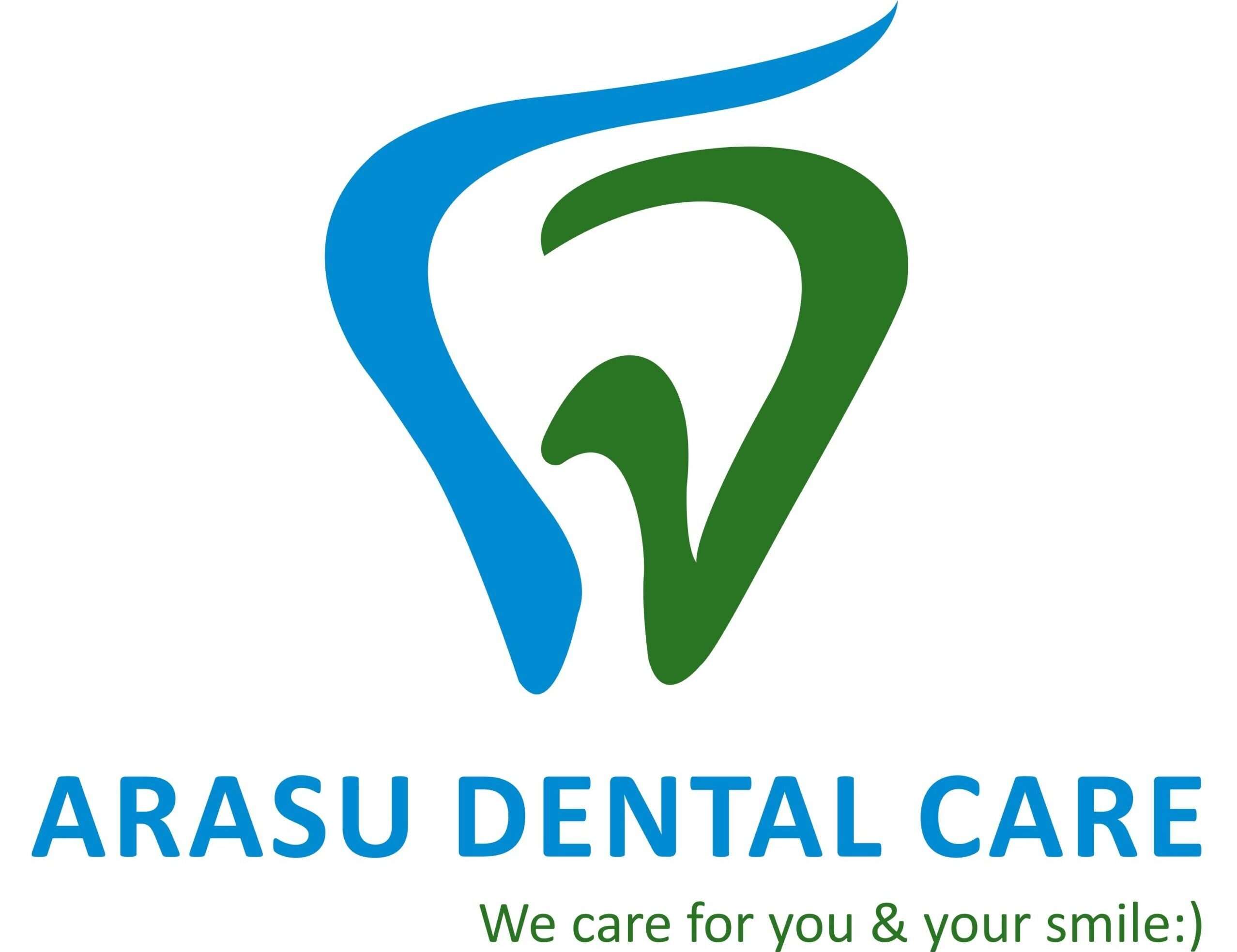Smile designing, also known as cosmetic dentistry or smile makeover, is a process of improving the appearance of a person’s smile through various dental procedures. It involves a combination of aesthetic dental treatments aimed at enhancing the overall aesthetics of the smile, including the color, shape, size, alignment, and proportion of the teeth, gums, and lips. Smile designing can transform a person’s smile and boost their self-confidence.

Here are some commonly used dental procedures in smile designing:
- Teeth Whitening: This procedure involves bleaching the teeth to remove stains and discoloration, resulting in a brighter and whiter smile.
- Dental Veneers: Veneers are thin, custom-made shells of tooth-colored material that are bonded to the front surface of the teeth to improve their shape, size, and color. They can help correct issues such as stained teeth, gaps, chips, or misaligned teeth.
- Dental Crowns: Crowns are tooth-shaped caps that are placed over damaged or decayed teeth to restore their shape, size, strength, and appearance. They can be used to improve the aesthetics of teeth with severe discoloration, misalignment, or other cosmetic issues.
- Orthodontic Treatment: Orthodontic treatments, such as braces or clear aligners, can be used to correct misaligned teeth, overcrowding, or bite issues, which can greatly improve the appearance of the smile.
- Gum Contouring: Gum contouring involves reshaping the gum line to create a more symmetrical and balanced appearance. It is commonly done to correct a “gummy” smile or uneven gum line.
- Dental Implants: Dental implants are used to replace missing teeth and can provide a natural-looking and functional solution for restoring a complete smile.
- Composite Bonding: This procedure involves applying tooth-colored composite resin to the teeth to correct minor cosmetic issues such as chips, gaps, or discoloration.
- Smile Analysis and Digital Smile Design: Advanced digital technologies and smile analysis tools can help dentists plan and design a customized smile for each patient, considering their facial features, dental condition, and personal preferences.
It’s important to note that the specific procedures used in smile designing will depend on the individual’s dental needs, goals, and budget. Consulting with a qualified cosmetic dentist or prosthodontist is recommended to determine the most appropriate treatment plan for achieving the desired smile makeover results.
ass
STRAIGHT TEETH – IT’S NOT JUST ABOUT A PRETTY SMILE!

Braces have become a common treatment for both teenagers and adults who want a straighter, more beautiful looking smile. A pretty smile is nice, but there are also medical benefits of braces, some of which may surprise you.
Benefits of Braces
Improved bite
While one of the goals of getting braces is to correct crooked teeth, they are also used to correct poorly aligned bites. A “bite” is the dental term that explains how your upper and lower teeth fit together. When you have gaps in your bite from missing teeth or poorly aligned teeth, it can impact your ability to break food down, a critical part of healthy digestion. A poorly aligned bite can impact one’s ability to chew properly and even to eat.
If left untreated, a misaligned bite can become painful as your jaw has to work harder to chew; which can result in lock jaw, TMJ disorder, and jaw pain related headaches, all of which may require complicated dental and medical treatment.
Improved Alignment of the Jaw
Overcrowded teeth or jaw misalignment can cause some speech impediments. The good news is orthodontic treatment can address both jaw and palate alignment that cause the speech impediments. As a part of the orthodontic treatment, an expander may need to be used to widen the palate before braces are applied
An expansion in your palate can also result in better breathing, less snoring, and potentially improved ear and sinus issues that are a result of jaw misalignment as well. In fact, proper jaw alignment can change the way you look by bringing your face into proper proportions.
Better Oral Care Habits
When you have crowded and misaligned teeth, they are harder to clean. Parts of the tooth may be hiding behind another tooth, making proper brushing and flossing almost impossible. When teeth can’t be properly cleaned, bacteria can build up, and this bacteria leads to gum disease and cavities. By straightening crowded teeth, brushing and flossing should be naturally improved.
Good oral care habits include brushing twice a day, using mouthwash and flossing daily. For those with braces, the need for good oral care becomes even more important to prevent bad breath, gum disease, and staining of teeth. With braces, extra care needs to be taken to properly brush and floss between and around the brackets and wires. This can create new habits that, along with more regular visits to the dentist, will result in better habits that will last a lifetime.
More Confidence
Confidence is shown to lead to more overall success in life. When people hide their smile due to embarrassment, they are less likely to take the risks required to go after a top job or to ask for a promotion. When a person is no longer embarrassed by their smile, they naturally feel more confidence which is reported to lead to leads to more happiness, greater productivity, less social anxiety and ultimately better health.
With improved function of your smile, better oral care habits and more confidence, it’s clear the benefits of braces are just as important, if not more important, than a nice-looking smile.
3 WAYS DENTAL IMPLANTS IMPROVE QUALITY OF LIFE

If you’ve recently undergone teeth removal or if you’re missing teeth or know that you’re going to need teeth removed soon, there are a number of options available when it comes to teeth replacement. However, one choice stands out above the rest, and that choice is dental implants.
One of the major reasons why dental implants are often considered as superior tooth replacement option is that they can significantly improve your quality of life in ways that other tooth replacement options cannot. Let’s take a look at some of the benefits of dental implants.
- You Can Eat Without Limitations
If you’re already missing teeth or if you have teeth that are damaged or decayed enough that they will need to be removed, you’re probably experiencing restrictions in what you can eat. Crisp fruits and vegetables, meats, and snacks are all pretty difficult to eat when your teeth are missing or damaged.
Because dental implants are anchored firmly to your jaw bone similar to the roots of your natural teeth, these restrictions on your diet are minimal to zero. It’s like having a set of new, undamaged natural teeth that you can use to bite and chew with the force required to eat whatever you want. Other tooth replacement options, like dentures, are not anchored firmly in place and therefore do not allow you to eat certain foods. But with dental implants, you have the freedom to eat a varied diet of foods that you enjoy.
- You Can Smile With Confidence
Smile surveys indicate that nearly half of adults think that a smile is the most memorable feature of someone that they meet for the first time. Smiles far outpace other memorable features, like speech, attire, and smell. And attractive smiles make the most positive first impressions. But chances are that if you have missing or damaged teeth, you’re not smiling with confidence when you meet new people. You might avoid smiling, and you may worry that if you reveal your teeth, you’ll be judged negatively.
Dental implants can restore your dazzling smile and allow you to reveal your teeth without fear or worry. Unlike dentures, you don’t have to worry that they’ll slip out of place while you’re smiling or speaking.
- Your Teeth Are Restored For Life
Once your dental implants are in place, your dentist will instruct you on how to take care of them. It’s not difficult—caring for your dental implants is no different than caring for natural teeth. Just daily brushing, flossing, planning dental visits regularly, and maintain a tooth-healthy diet. If you do that, the chances are high that your dental implants will last for the rest of your life.
Other tooth replacement options will eventually need to be replaced, even if you take optimal care of them. Dentures can crack, chip, or break, and over time they’ll become worn. They’ll need to be adjusted or replaced periodically. Bridges not only need to be replaced periodically, but they can also damage the surrounding teeth, resulting in more dental work. Only dental implants can give you the benefit of knowing that your new teeth are in place for life.
If you’re in need of tooth replacement, dental implants might be right for you. Contact us for more information and to schedule a consultation.
BE PROUD OF YOUR MOUTH!
Did you know that March 20th is celebrated as World Oral Health Day? The theme for the next three years sends out a simple, but powerful message : BE PROUD OF YOUR MOUTH. It simply translates to – value it and take care of it.
Good oral health is important for your mouth and teeth, and it also has a positive impact on your general health, well-being and quality of life. And that is truly something worth taking action for.
Here we bring to you 5 small changes in our oral health routine that can give our oral health a massive boost!
1. Brushing twice daily using a fluoridated toothpaste
It’s simple, and you’ve probably heard it before. This is by far the most effective everyday practice you can implement to improve your oral health. Brushing twice a day not only removes plaque and bacteria from your teeth and gums – the fluoride in the toothpaste ensures that your teeth stay protected throughout the day.
For children up to three years old they should use a smear of toothpaste with a fluoride level of no less than 1000ppm (parts per million). After three years old we recommend using a pea-sized amount of toothpaste that contains 1350ppm to 1500ppm.
2. Cutting down on sugary, acidic foods and drinks
When foods with carbohydrates like bread, cereal, milk, aerated drinks, fruit, cake, or candy stay on your teeth, the bacteria in your mouth turn them into acids. The bacteria, acid, food debris, and your saliva combine to form plaque, which clings to your teeth. The acids in plaque dissolve the enamel, creating holes called cavities.
Many people think that only children get cavities, but changes in your mouth as you age make them an adult problem, too. As you get older, your gums pull away from your teeth. They can also pull away because of gum disease. This exposes the roots of your teeth to plaque. And if you eat a lot of sugary or high-carb foods, you’re more likely to get cavities.
3. Visiting the dentist twice a year
This one is very important. Just like how you need to regularly take your car to be serviced, your mouth needs servicing too and the dentist is in the best position to do it. You shouldn’t just visit the dentist when you have a problem, by then, it’s too late. By going regularly, as you can stay on top of your oral health and stop oral health problems such as tooth decay before they’ve settled in. This will save you time and money as you won’t need to go in for extra visits to sort out issues.
4. Start flossing!
You might of heard this term – flossing, but don’t we all think it is unnecessary or time consuming to do it?
The bottom line is that whilst brushing your teeth is vital, your toothbrush can’t reach everywhere. Floss or interdental brushes get where your toothbrush can’t – in between your teeth. By leaving these areas untouched they can become a breeding ground for plaque which can go on to cause both tooth decay and gum disease. Another thing we would like to add- flossing your entire mouth everyday will hardly take a minute of your time!
By starting this practice and sticking to it you’ll not only just be making your dentist happy, your teeth and gums will really appreciate it too!
5. Don’t neglect your tongue
All too often, we tend to prioritize brushing routine without thinking twice about the cleanliness of the tongue. However, it takes up a large amount of real estate in your mouth and can quickly become a breeding ground for bacteria. Therefore, make sure to use your toothbrush or a tongue scraper to gently clean your tongue from front to back twice a day.

